Thanksgiving is about family, friends, and, of course, food. While indulging in wonderful holiday goodies is part of the ritual, overeating and gaining weight are possible. But do not worry! With a little forethought and cautious eating, you may enjoy the celebrations without jeopardizing your weight loss efforts.
1- Eat a Balanced Breakfast

A healthy breakfast is an excellent way to begin your day. It gives your body the energy and nourishment it requires to function efficiently. By filling up in the morning, you may increase your focus, boost your metabolism, and maintain a healthy weight.
Why is breakfast important on Holiday?
- Energy boost: A nutritious meal gives you the energy you need to go through the morning.
- Improved focus: Breakfast can help you concentrate and perform better cognitively.
- Weight management: Research indicates that those who eat breakfast are more likely to maintain a healthy weight.
- A healthy meal can help lower the risk of heart disease, type 2 diabetes, and other chronic disorders.
What makes a balanced breakfast?
- Complex carbohydrates: These provide sustained energy throughout the morning. Good sources include whole-grain bread, oatmeal, and whole-grain cereals.
- Protein: Protein helps repair and build tissues, and it can help you feel fuller for longer. Good sources include eggs, Greek yogurt, and nuts.
- Healthy fats: Healthy fats support brain function and hormone production. Good sources include avocados, nuts, and seeds.
- Fruits and vegetables: These provide essential vitamins, minerals, and fiber.
Healthy breakfast ideas on Holiday
- Complex carbs provide consistent energy throughout the morning. Whole grain bread, oats, and cereals are all good sources.
- Protein aids in tissue repair and building, as well as making you feel fuller for extended periods. Good sources include eggs, Greek yogurt, and nuts.
- Healthy fats promote brain function and hormone production. Avocados, nuts, and seeds are all good sources.
- Fruits and vegetables contain important vitamins, minerals, and fiber
You may prepare yourself for a successful day by prioritizing breakfast. Select wholesome, filling foods, and experiment with different options to keep your meals fresh.
2- Practice Portion Control
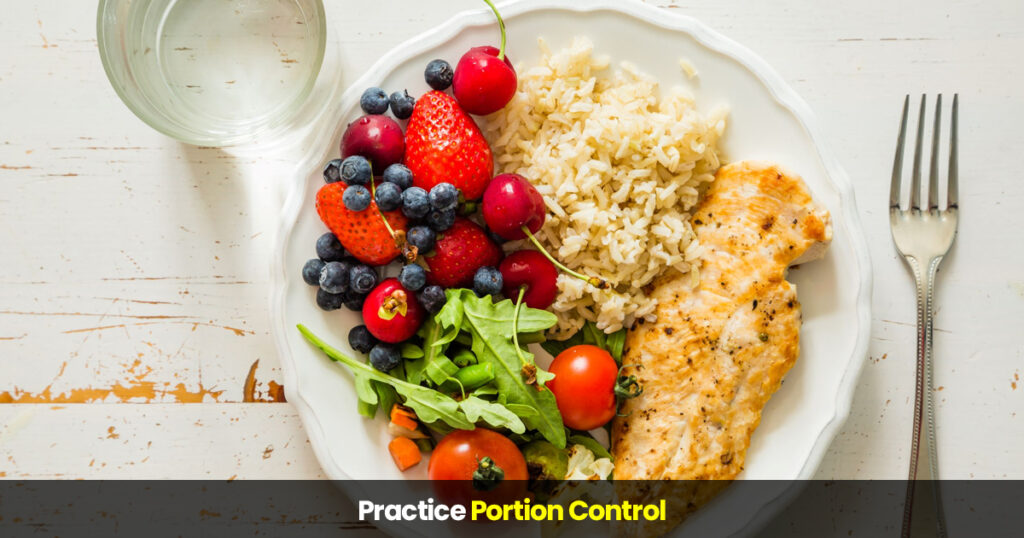
A straightforward yet effective strategy is portion control, which is consuming the appropriate quantity of food. It gives you more energy, helps you keep a healthy weight, and enhances your general health.
Why is Portion Control Important on Holiday?
- Weight management: You can prevent overeating and maintain a healthy weight by eating adequate portions.
- Better Digestion: Eating more frequently and in smaller portions can help with digestion and avoid discomfort.
- Balanced Nutrition: By controlling portion sizes, you can obtain the proper ratio of nutrients without going overboard.
Tips for Effective Portion Control On Holiday
- Use Smaller Plates
- Listen to Your Body
- Cook Smart
- Read Food Labels
- Use Measuring Tools
- Eat Slowly
- Hydrate
- Mindful Eating
- Healthy Snacking
- Limit Liquid Calories
By adopting these suggestions into your everyday routine, you can effectively practice portion control and live a healthier lifestyle. Remember, it’s not about deprivation but about making deliberate decisions.
3- Choose Wisely: Food Choices on Thanksgiving

When it comes to Thanksgiving dinner, the buffet table presents an array of tempting foods. To make healthy decisions, consider the following suggestions:
Prioritize Protein and Vegetables
- Lean Protein: Choose lean protein sources such as turkey, chicken, and fish. These will help you feel full and satisfied.
- Colorful Vegetables: Pile your plate with a variety of colorful vegetables. They are low in calories, high in nutrients, and can make you feel full.
Be Mindful of Carbs
- Portion control: Limit your consumption of starchy side dishes such as mashed potatoes and stuffing.
- Whole Grains: When available, choose whole grains over refined grains because they are more satisfying and healthy.
Watch Out for Hidden Sugars and Fats
- Sauces and gravies may be heavy in calories and harmful fats. Use them sparingly.
- Desserts: Enjoy a small serving of your favorite dessert, but be cautious of the sugar and fat levels.
Listen to Your Body
- Hunger cues: Pay attention to your hunger and fullness signals. Stop eating when you’re satisfied, not full.
You may enjoy your Thanksgiving feast without overeating by making conscious decisions and exercising portion control. Remember that it’s all about balance and moderation.
4- Hydrate, Hydrate, Hydrate: The Key to Well-being

In order for our bodies to work correctly, water is paramount. It aids in temperature regulation, nutrient transport, and toxin elimination. Headaches, lethargy, and diminished cognitive function are just a few of the symptoms that dehydration can bring.
Tips for Staying Hydrated on Thanksgiving Holiday
- Drink Water Regularly
- Eat Water-Rich Food
- Flavor Your Water
- Limit Sugary Drinks
- Listen to Your Body
Benefits of Staying Hydrated
- Improved Skin Health: Hydration keeps your skin hydrated and attractive.
- Increased Energy: Water aids in the transfer of oxygen and nutrients to your cells, resulting in increased energy levels.
- Enhanced Cognitive Function: Staying hydrated can help with focus, memory, and overall brain function.
- Aided Digestion: Water promotes digestion and reduces constipation.
- Weight Management: Drinking water might make you feel fuller, which reduces the desire to overeat. Water is required for our bodies to function normally. It regulates body temperature, distributes nutrients, and removes pollutants. Dehydration can cause several health problems, including headaches, exhaustion, and decreased cognitive function.
.Making water a priority can benefit your entire health and well-being. Remember to drink up!
5- Beware of Hidden Calories: Sneaky Sources to Avoid on Holiday

While many individuals focus on calorie counts in apparent foods like burgers and fries, it’s easy to miss the hidden calories lurking in otherwise healthful or innocent goods. These hidden calories might undermine your weight loss efforts and jeopardize your general health.
Common Culprits of Hidden Calories
- Sauces and Dressings
- Beverages
- Processed Foods
- Coffee Drinks
- Alcohol
Tips to Avoid Hidden Calories
- Read Food Labels Carefully: Pay attention to serving sizes and nutritional information.
- Cook at home. Preparing meals at home allows you to control the ingredients and portions.
- Choose whole foods. Choose fresh fruits, veggies, and whole grains.
- Limit processed foods. Reduce your consumption of processed snacks and packaged foods.
- Use sauces and dressings sparingly.
You may take charge of your diet and reach your health objectives by becoming aware of these hidden calorie offenders and making informed choices.
6- Move More: A Prescription for a Healthier You

- Improve Cardiovascular Health: Lowers the risk of heart disease, stroke, and hypertension.
- Improves Mental Health: Lowers stress, anxiety, and depression.
- Weight Management: Helps to burn calories and maintain a healthy weight.
- Strengthens bones and muscles, lowering the risk of osteoporosis and injury.
- Improves Sleep Quality: Encourages healthier sleep habits.
How to Incorporate More Movement into Your Life
- Start tiny: Set tiny, attainable goals, such as taking a 10-minute walk every day.
- Find Activities You Enjoy: Select activities that you find enjoyable and motivating, such as dance, swimming, or cycling.
- Make it a Habit: Integrate physical activity into your daily routine like you would any other key appointment.
- Break it up. Divide your workout into small, frequent periods throughout the day.
- Incorporate Movement into Your Daily Life: Use the stairs instead of the elevator, park farther away from the store, or go for a walk during your lunch break.
- Find a Workout Partner: A workout buddy can help you stay motivated and accountable.
- Monitor Your Progress: Use a fitness tracker or journal to keep track of your activities and celebrate your accomplishments.
Remember
- Consult Your Doctor: Before beginning any new workout plan, talk to your doctor, especially if you have any underlying health issues.
- Listen to your body. Pay attention to your body’s cues and rest as needed.
- Stay hydrated by drinking plenty of water before, during, and after exercise.
- Warm-up and Cool-down: Warm up before your workout to prepare your muscles, then cool down afterwards to reduce muscular discomfort.
By incorporating more physical activity into your daily routine, you may improve your physical and mental health, increase your energy, and improve your overall quality of life.
7- Mindful Eating: A Path to Healthier Habits
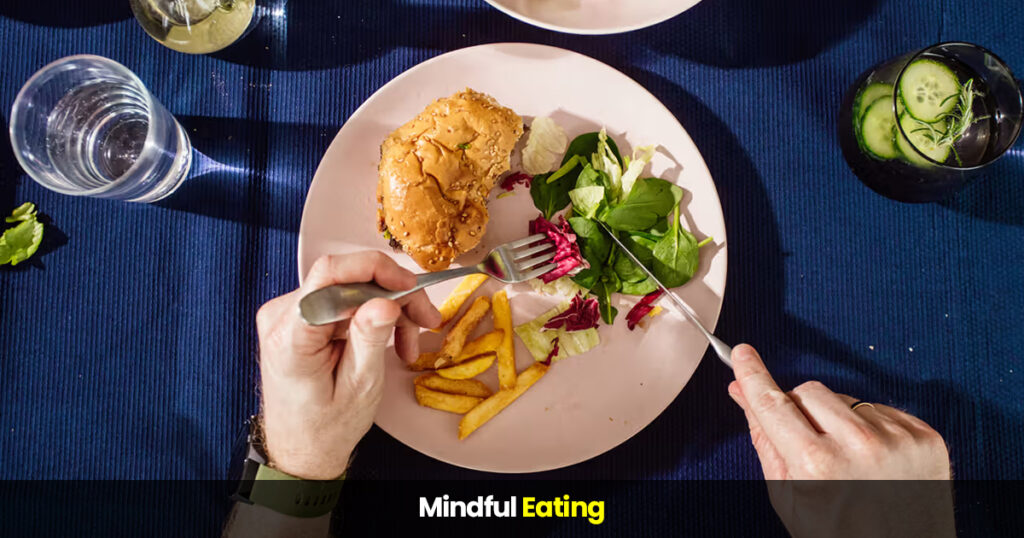
Mindful eating is a discipline in which you pay attention to your body’s hunger and fullness cues, taste your food, and eat without interruptions. By practicing mindful eating, you can improve your connection with food, make healthier choices, and have a more enjoyable dining experience.
Key Principles of Mindful Eating
- Eat Slowly: Take your time chewing your food fully and enjoying each bite.
- Eat Without Distractions: Do not eat in front of the television or computer. Concentrate on your meal.
- Listen to your body’s hunger and fullness cues. Eat when you’re hungry, and quit when you’re full.
- Choose wisely: Choose foods that are both nutritious and pleasurable.
- Practice gratitude: Appreciate what you’re consuming and the individuals who helped make it.
Tips for Mindful Eating
- Begin with little portions: This will help you avoid overeating.
- Use smaller plates to visually reduce serving amounts.
- Eat Regularly: Avoid skipping meals, as this can lead to overeating later.
- Hydrate: Drink plenty of water throughout the day to stay hydrated and curb hunger cravings.
- Practice mindfulness techniques: Meditation and deep breathing can help you remain present and focused.
By incorporating mindful eating into your daily routine, you may foster a healthier connection with food and enhance your overall health. Focused.
8- Avoid Grazing: A Strategy for Healthy Eating
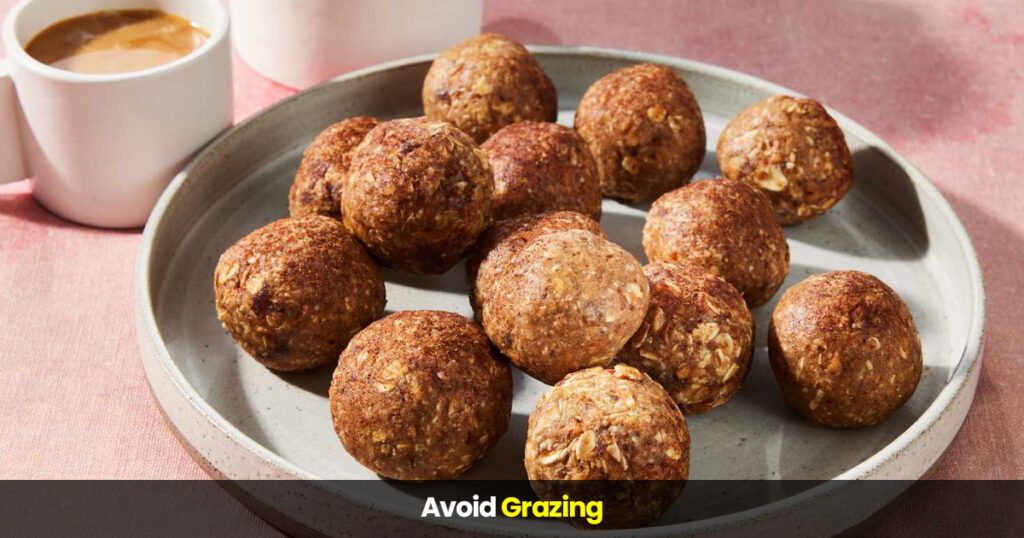
Grazing, or snacking throughout the day, can lead to overeating and weight gain. It can also disrupt your body’s natural hunger and satiety cues. To avoid grazing, consider the following strategies
1- Plan Your Meals
- To avoid feeling hungry all the time, schedule regular meals and snacks.
- Prepare healthful snacks in advance to keep on hand.
2- Mindful Snacking
- If you do snack, consider nutrient-dense foods such as fruits, vegetables, almonds, or yogurt.
- Limit your portion sizes and keep your calorie intake under control.
3- Stay Hydrated
- Drink plenty of water throughout the day to help you feel less hungry.
- Sometimes thirst might be mistaken for hunger.
4- Practice Portion Control
- Use smaller dishes and bowls to keep portion amounts under control during meals.
- When cooking food, remember to consider serving sizes.
5- Avoid Trigger Foods
- Use smaller dishes and bowls to keep portion amounts under control during meals.
- When cooking food, remember to consider serving sizes.
6- Mindful Eating
- Pay heed to your body’s hunger and fullness signals.
- Eat gently and relish every bite.
7- Get Enough Sleep
- Adequate sleep helps regulate hormones that control hunger and satiety
Implementing these tactics will allow you to cut back on grazing, maintain a healthy weight, and enhance your overall health. Remember, it’s all about making deliberate decisions and listening to your body’s demands.
9- Don’t Skip Meals: Fuel Your Body for Optimal Health
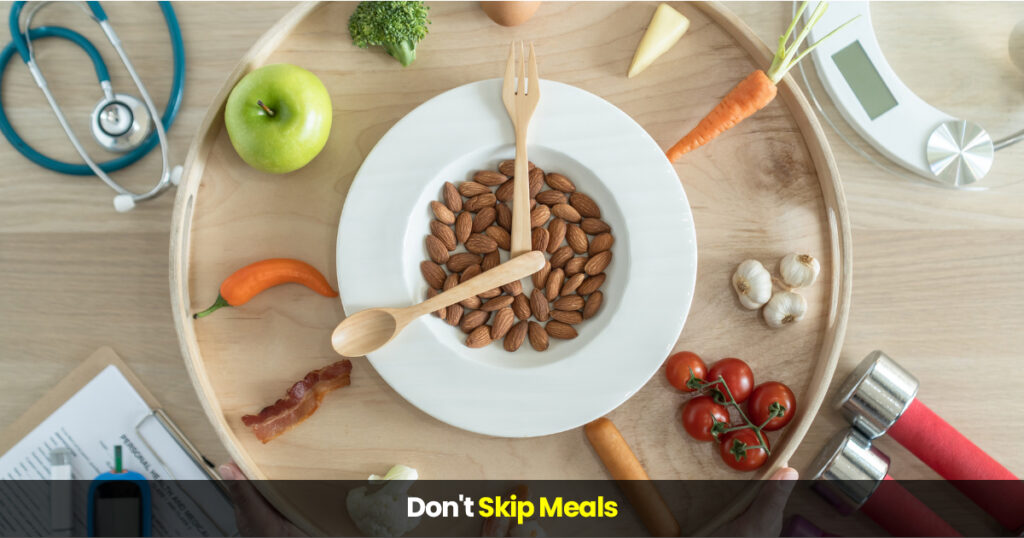
Skipping meals may appear to be a quick approach to reducing calories, but it can actually lead to overeating later in the day. When you miss meals, your blood sugar levels fall, which can cause weariness, irritation, and problems concentrating.
Why You Shouldn’t Skip Meals
- Weight Gain: Skipping meals might lead to overeating later in the day since your body needs energy.
- Poor Nutrient Intake: Skipping meals can lead to an insufficient intake of important vitamins and minerals.
- Decreased Energy: Your body requires fuel to perform correctly. Skipping meals can cause weariness and low energy.
- Skipping meals might cause intestinal problems such as constipation.
Tips for Healthy Eating
- Eat Regular Meals: Aim for three meals every day, with healthy snacks in between.
- Plan: Prepare meals and snacks ahead of time to prevent missing meals due to time constraints.
- Select Nutrient-dense Foods: Concentrate on whole grains, lean proteins, fruits, and veggies.
- Listen to Your Body: Eat when you’re hungry, quit when you’re full.
- Stay Hydrated: Drink plenty of water throughout the day to avoid confusing thirst and hunger.
Eating regular meals and snacks allows you to maintain a healthy weight, increase your energy levels, and enhance your overall health.
10- Plan for Leftovers: Turn Your Thanksgiving Feast into a Week of Delicious Meals
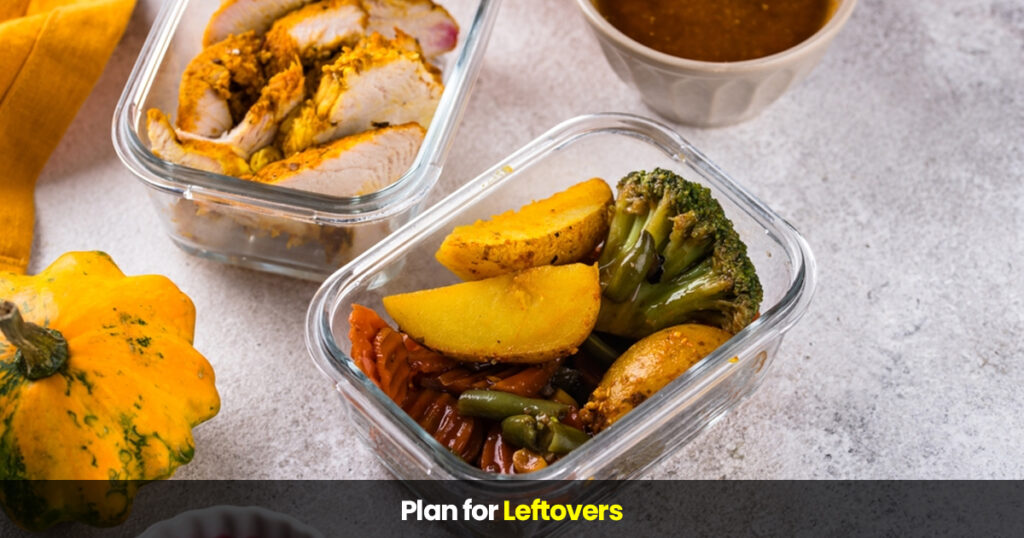
Thanksgiving frequently provides us with plenty of delectable leftovers. Instead of wasting them, get creative and use them to make a week’s worth of delicious meals.
Classic Leftover Dishes
- Turkey Sandwiches are a classic for a reason! Use leftover turkey, stuffing, and cranberry sauce to make wonderful sandwiches.
- Turkey Soup: Turn leftover turkey into a substantial soup by adding vegetables, stock, and noodles.
- Turkey Pot Pie: To make a soothing pot pie, fill a pie crust with turkey, vegetables, and gravy.
- Leftover Mashed Potato Pancakes: To sweeten your leftovers, fried mashed potatoes and sprinkle with applesauce or syrup.
Creative Leftover Ideas
- Turkey Fried Rice is a tasty Asian-inspired dish made using leftover turkey, rice, veggies, and soy sauce.
- Top pizza dough with turkey, vegetables, and cheese for a new take on pizza night.
- Turkey Chili: Combine leftover turkey, beans, tomatoes, and spices to make a substantial and savory chili.
- Turkey and Vegetable Stir-Fry: Cook leftover turkey and vegetables in your preferred stir-fry sauce.
Tips for Storing Leftovers
- Cool quickly: Refrigerate any leftovers within two hours of cooking.
- Store properly: Use airtight containers to avoid foodborne illness.
- Freeze for Later: Save leftovers in smaller portions for future meals.
By preparing ahead and getting creative with your leftovers, you may savor the delectable flavors of Thanksgiving for days on end.
Conclusion
Thanksgiving does not have to be a time when you gain weight. By using these tactics, you can enjoy the holiday season without jeopardizing your health goals. Remember that it’s all about balance and moderation. By making thoughtful decisions, exercising portion control, and being active, you may enjoy the season’s delights while staying in shape.
So, this Thanksgiving, eat sensibly, spend time with loved ones, and leave feeling satisfied rather than stuffed.

